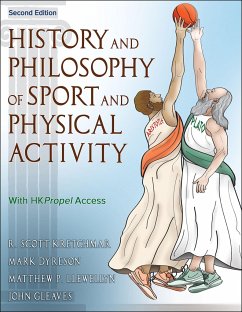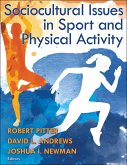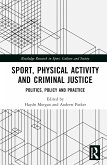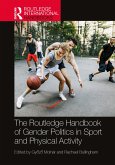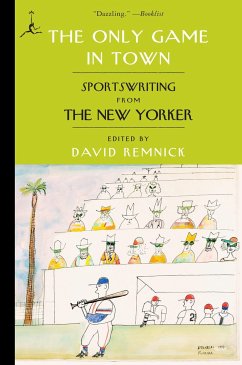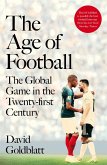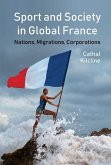R. Scott Kretchmar, Mark Dyreson, Matt Llewellyn
History and Philosophy of Sport and Physical Activity
R. Scott Kretchmar, Mark Dyreson, Matt Llewellyn
History and Philosophy of Sport and Physical Activity
- Broschiertes Buch
- Merkliste
- Auf die Merkliste
- Bewerten Bewerten
- Teilen
- Produkt teilen
- Produkterinnerung
- Produkterinnerung
History and Philosophy of Sport and Physical Activity, Second Edition, blends historical investigations and philosophical insights regarding sport and physical activity. This cross-disciplinary text shows how theory in the humanities can affect professional practice.
Andere Kunden interessierten sich auch für
![Sociocultural Issues in Sport and Physical Activity Sociocultural Issues in Sport and Physical Activity]() Sociocultural Issues in Sport and Physical Activity95,99 €
Sociocultural Issues in Sport and Physical Activity95,99 €![Education in Sport and Physical Activity Education in Sport and Physical Activity]() Education in Sport and Physical Activity45,99 €
Education in Sport and Physical Activity45,99 €![Sport, Physical Activity and Criminal Justice Sport, Physical Activity and Criminal Justice]() Sport, Physical Activity and Criminal Justice169,99 €
Sport, Physical Activity and Criminal Justice169,99 €![The Routledge Handbook of Gender Politics in Sport and Physical Activity The Routledge Handbook of Gender Politics in Sport and Physical Activity]() The Routledge Handbook of Gender Politics in Sport and Physical Activity231,99 €
The Routledge Handbook of Gender Politics in Sport and Physical Activity231,99 €![The Only Game in Town The Only Game in Town]() The Only Game in Town21,99 €
The Only Game in Town21,99 €![The Age of Football The Age of Football]() David GoldblattThe Age of Football27,99 €
David GoldblattThe Age of Football27,99 €![Sport and Society in Global France Sport and Society in Global France]() Cathal KilclineSport and Society in Global France31,99 €
Cathal KilclineSport and Society in Global France31,99 €-
-
-
History and Philosophy of Sport and Physical Activity, Second Edition, blends historical investigations and philosophical insights regarding sport and physical activity. This cross-disciplinary text shows how theory in the humanities can affect professional practice.
Hinweis: Dieser Artikel kann nur an eine deutsche Lieferadresse ausgeliefert werden.
Hinweis: Dieser Artikel kann nur an eine deutsche Lieferadresse ausgeliefert werden.
Produktdetails
- Produktdetails
- Verlag: Human Kinetics Publishers
- 2 ed
- Seitenzahl: 368
- Erscheinungstermin: 26. Juli 2023
- Englisch
- Abmessung: 281mm x 216mm x 23mm
- Gewicht: 1016g
- ISBN-13: 9781718212947
- ISBN-10: 1718212941
- Artikelnr.: 68100528
- Herstellerkennzeichnung
- Libri GmbH
- Europaallee 1
- 36244 Bad Hersfeld
- gpsr@libri.de
- Verlag: Human Kinetics Publishers
- 2 ed
- Seitenzahl: 368
- Erscheinungstermin: 26. Juli 2023
- Englisch
- Abmessung: 281mm x 216mm x 23mm
- Gewicht: 1016g
- ISBN-13: 9781718212947
- ISBN-10: 1718212941
- Artikelnr.: 68100528
- Herstellerkennzeichnung
- Libri GmbH
- Europaallee 1
- 36244 Bad Hersfeld
- gpsr@libri.de
R. Scott Kretchmar, PhD, is a professor emeritus of exercise and sport science at Penn State University in University Park, Pennsylvania. Kretchmar, a fellow in the National Academy of Kinesiology (NAK), is the recipient of its Hetherington Award. He is a former president of the International Association for the Philosophy of Sport and previously served as editor of the Journal of the Philosophy of Sport. He has been named an Alliance Scholar by SHAPE America (Society of Health and Physical Educators) and a Distinguished Scholar by the National Association for Kinesiology and Physical Education in Higher Education (NAKPEHE). Mark Dyreson, PhD, is a professor of kinesiology and an affiliate professor of history at Penn State University in University Park, Pennsylvania. Dyreson currently serves on the executive committee of the Penn State Center for the Study of Sports in Society. He is a fellow of the National Academy of Kinesiology (NAK), a former president of the North American Society for Sport History (NASSH), a special projects editor for the International Journal of the History of Sport, and the coeditor of the Sport in the Global Society: Historical Perspectives book series (Routledge Press). Matthew P. Llewellyn, PhD, is a professor of kinesiology at California State University at Fullerton and is codirector of the Center for Sociocultural Sport and Olympic Research. Llewellyn earned a PhD in historical and philosophical aspects of sport and physical activity at Pennsylvania State University. He is the current editor of the Journal of Olympic Studies and is the author of four books and over 30 scholarly articles on the history of sport and physical activity. John Gleaves, PhD, is a professor of kinesiology at California State University at Fullerton. Gleaves served as codirector of the International Network of Doping Research and is a codirector and cofounder of the Center for Sociocultural Sport and Olympic Research. He is also the associate editor for Performance Enhancement and Health and the Journal of Olympic Studies. His research and teaching focus on applied ethics and cultural history related to sport, physical activity, and society. Gleaves’ research has won several awards, including a Brocher Foundation fellowship.
Introduction: History, Philosophy, and Kinesiology
The Evolution of Kinesiology
The Humanities and the Sciences
The Nature of History and Philosophy
The Subject Matter of Kinesiology
Chapter 1. Bodies, Brains, and Cultures
Making Sense of Our Story
Developing a Brief Chronology of Our Story
Great Leaps Forward
Patterns of Culture in Hunter-Forager Societies
The Origins of Sport
The Complexities of Work and Play in Hunting and Foraging Societies
Chapter 2. The Transition From Super Endurance Predators to Farmers
A Revolution in How We Lived
The Impact of the Neolithic Revolution on Human Vigor and Health
Physical Activity as a Tool and as a Jewel
The Difficulties of Interpreting Ancient Sporting Cultures
A Model of Traditional Sport
Chapter 3. Ancient Greece and the Shape of Modern Sport and Physical
Education
The Foundation of Western Civilization
Myth, Religion, and the Origins of Greek Physical Culture
The Birth of Philosophy
The Ancient Sporting Festivals
The Olympic Games
Greek Sporting Culture
Sources of Evidence for Ancient Greek Sport
Greek Recreation and Physical Education
Chapter 4. Continuity and Change in Physical Cultures
Monuments to Sporting Spectacles
Comparing Mesoamerican and Roman Spectacles of Blood
Opposition to Gladiatorial Contests
The Ethics of Brutality in Sport
Contrast and Continuity
The Enduring Martial Traditions
Religious and Intellectual Opposition to Martial Sports
Similarities and Differences Between Eastern and Western Sport
Global Continuities and Contrasts
Chapter 5. The Expansion of the West and the Birth of the Modern World
The Birth of the “Modern World”
The Renaissance, Neoclassical Revivals of Sport, and the “Nature of Man”
The Emergence of “Modern” Debates on Human Nature
The Protestant Reformation and Sport, Physical Education, and the Body
The Scientific Revolution and Modern Attitudes Toward Sport, Physical
Education, and the Body
Chapter 6. Great Britain and the Birth of Modern Sport
Sport as a Critical Modern Institution
The Rationalization of Ethics Under Utilitarianism
Rationalization and Gambling
Games for the Common Folk
The Rationalization of Fair Play
Chapter 7. Liberty, Equality, Fraternity
The Emergence of Modern Sport
Liberty, Equality, and Morality
The Role of Fraternity in Modern Sport
Fraternity, Partisanship, and Spectatorship
Fraternity, Partisanship, and Commercialism
Chapter 8. Games and Empires
The Paradoxical Power of Sport
Conquest, Colonialism, and the Spread of Western Sport
Sport in Its Best Light
The Subaltern Dilemma
Sport as a Revolutionary Force
Sport, Colonialism, and American Imperialism
Chapter 9. The Rise of International Sportsworlds
Reviving the Olympic Games
Olympic Growing Pains
Social Exclusion and Other Harsh Realities of the Early Olympics
The Globalization of Modern Sport
Sport in Black and White and Technicolor
The Ethics of Commercialism
Chapter 10. The West and the Rest
Traditional and Indigenous Sport in an Age of Modernity
Western Appropriations of Eastern Muses
The Effectiveness of Folk Psychology and Folk Medicine
Encounters With the “Other”
Holistic Kinesiology
The Emergence of Countercultural Movement Practices
Chapter 11. The Golden Age of Modern Sport
Phenomenology
Cold War Sport
Modern Science and Sport
The Ethics of Performance Enhancement
Breaking Gender Barriers
Beyond the Gender Binary
The Cold War and the Politics of Race in American Sport
The Global Dimensions of Race and Sport
Sport in Living Color
Chapter 12. Snapshots From Our Times
Do Global Connections Create Global Identities?
Global Consumer Culture
The Emergence of New Global Forms
The Evolution of Kinesiology
The Humanities and the Sciences
The Nature of History and Philosophy
The Subject Matter of Kinesiology
Chapter 1. Bodies, Brains, and Cultures
Making Sense of Our Story
Developing a Brief Chronology of Our Story
Great Leaps Forward
Patterns of Culture in Hunter-Forager Societies
The Origins of Sport
The Complexities of Work and Play in Hunting and Foraging Societies
Chapter 2. The Transition From Super Endurance Predators to Farmers
A Revolution in How We Lived
The Impact of the Neolithic Revolution on Human Vigor and Health
Physical Activity as a Tool and as a Jewel
The Difficulties of Interpreting Ancient Sporting Cultures
A Model of Traditional Sport
Chapter 3. Ancient Greece and the Shape of Modern Sport and Physical
Education
The Foundation of Western Civilization
Myth, Religion, and the Origins of Greek Physical Culture
The Birth of Philosophy
The Ancient Sporting Festivals
The Olympic Games
Greek Sporting Culture
Sources of Evidence for Ancient Greek Sport
Greek Recreation and Physical Education
Chapter 4. Continuity and Change in Physical Cultures
Monuments to Sporting Spectacles
Comparing Mesoamerican and Roman Spectacles of Blood
Opposition to Gladiatorial Contests
The Ethics of Brutality in Sport
Contrast and Continuity
The Enduring Martial Traditions
Religious and Intellectual Opposition to Martial Sports
Similarities and Differences Between Eastern and Western Sport
Global Continuities and Contrasts
Chapter 5. The Expansion of the West and the Birth of the Modern World
The Birth of the “Modern World”
The Renaissance, Neoclassical Revivals of Sport, and the “Nature of Man”
The Emergence of “Modern” Debates on Human Nature
The Protestant Reformation and Sport, Physical Education, and the Body
The Scientific Revolution and Modern Attitudes Toward Sport, Physical
Education, and the Body
Chapter 6. Great Britain and the Birth of Modern Sport
Sport as a Critical Modern Institution
The Rationalization of Ethics Under Utilitarianism
Rationalization and Gambling
Games for the Common Folk
The Rationalization of Fair Play
Chapter 7. Liberty, Equality, Fraternity
The Emergence of Modern Sport
Liberty, Equality, and Morality
The Role of Fraternity in Modern Sport
Fraternity, Partisanship, and Spectatorship
Fraternity, Partisanship, and Commercialism
Chapter 8. Games and Empires
The Paradoxical Power of Sport
Conquest, Colonialism, and the Spread of Western Sport
Sport in Its Best Light
The Subaltern Dilemma
Sport as a Revolutionary Force
Sport, Colonialism, and American Imperialism
Chapter 9. The Rise of International Sportsworlds
Reviving the Olympic Games
Olympic Growing Pains
Social Exclusion and Other Harsh Realities of the Early Olympics
The Globalization of Modern Sport
Sport in Black and White and Technicolor
The Ethics of Commercialism
Chapter 10. The West and the Rest
Traditional and Indigenous Sport in an Age of Modernity
Western Appropriations of Eastern Muses
The Effectiveness of Folk Psychology and Folk Medicine
Encounters With the “Other”
Holistic Kinesiology
The Emergence of Countercultural Movement Practices
Chapter 11. The Golden Age of Modern Sport
Phenomenology
Cold War Sport
Modern Science and Sport
The Ethics of Performance Enhancement
Breaking Gender Barriers
Beyond the Gender Binary
The Cold War and the Politics of Race in American Sport
The Global Dimensions of Race and Sport
Sport in Living Color
Chapter 12. Snapshots From Our Times
Do Global Connections Create Global Identities?
Global Consumer Culture
The Emergence of New Global Forms
Introduction: History, Philosophy, and Kinesiology
The Evolution of Kinesiology
The Humanities and the Sciences
The Nature of History and Philosophy
The Subject Matter of Kinesiology
Chapter 1. Bodies, Brains, and Cultures
Making Sense of Our Story
Developing a Brief Chronology of Our Story
Great Leaps Forward
Patterns of Culture in Hunter-Forager Societies
The Origins of Sport
The Complexities of Work and Play in Hunting and Foraging Societies
Chapter 2. The Transition From Super Endurance Predators to Farmers
A Revolution in How We Lived
The Impact of the Neolithic Revolution on Human Vigor and Health
Physical Activity as a Tool and as a Jewel
The Difficulties of Interpreting Ancient Sporting Cultures
A Model of Traditional Sport
Chapter 3. Ancient Greece and the Shape of Modern Sport and Physical
Education
The Foundation of Western Civilization
Myth, Religion, and the Origins of Greek Physical Culture
The Birth of Philosophy
The Ancient Sporting Festivals
The Olympic Games
Greek Sporting Culture
Sources of Evidence for Ancient Greek Sport
Greek Recreation and Physical Education
Chapter 4. Continuity and Change in Physical Cultures
Monuments to Sporting Spectacles
Comparing Mesoamerican and Roman Spectacles of Blood
Opposition to Gladiatorial Contests
The Ethics of Brutality in Sport
Contrast and Continuity
The Enduring Martial Traditions
Religious and Intellectual Opposition to Martial Sports
Similarities and Differences Between Eastern and Western Sport
Global Continuities and Contrasts
Chapter 5. The Expansion of the West and the Birth of the Modern World
The Birth of the “Modern World”
The Renaissance, Neoclassical Revivals of Sport, and the “Nature of Man”
The Emergence of “Modern” Debates on Human Nature
The Protestant Reformation and Sport, Physical Education, and the Body
The Scientific Revolution and Modern Attitudes Toward Sport, Physical
Education, and the Body
Chapter 6. Great Britain and the Birth of Modern Sport
Sport as a Critical Modern Institution
The Rationalization of Ethics Under Utilitarianism
Rationalization and Gambling
Games for the Common Folk
The Rationalization of Fair Play
Chapter 7. Liberty, Equality, Fraternity
The Emergence of Modern Sport
Liberty, Equality, and Morality
The Role of Fraternity in Modern Sport
Fraternity, Partisanship, and Spectatorship
Fraternity, Partisanship, and Commercialism
Chapter 8. Games and Empires
The Paradoxical Power of Sport
Conquest, Colonialism, and the Spread of Western Sport
Sport in Its Best Light
The Subaltern Dilemma
Sport as a Revolutionary Force
Sport, Colonialism, and American Imperialism
Chapter 9. The Rise of International Sportsworlds
Reviving the Olympic Games
Olympic Growing Pains
Social Exclusion and Other Harsh Realities of the Early Olympics
The Globalization of Modern Sport
Sport in Black and White and Technicolor
The Ethics of Commercialism
Chapter 10. The West and the Rest
Traditional and Indigenous Sport in an Age of Modernity
Western Appropriations of Eastern Muses
The Effectiveness of Folk Psychology and Folk Medicine
Encounters With the “Other”
Holistic Kinesiology
The Emergence of Countercultural Movement Practices
Chapter 11. The Golden Age of Modern Sport
Phenomenology
Cold War Sport
Modern Science and Sport
The Ethics of Performance Enhancement
Breaking Gender Barriers
Beyond the Gender Binary
The Cold War and the Politics of Race in American Sport
The Global Dimensions of Race and Sport
Sport in Living Color
Chapter 12. Snapshots From Our Times
Do Global Connections Create Global Identities?
Global Consumer Culture
The Emergence of New Global Forms
The Evolution of Kinesiology
The Humanities and the Sciences
The Nature of History and Philosophy
The Subject Matter of Kinesiology
Chapter 1. Bodies, Brains, and Cultures
Making Sense of Our Story
Developing a Brief Chronology of Our Story
Great Leaps Forward
Patterns of Culture in Hunter-Forager Societies
The Origins of Sport
The Complexities of Work and Play in Hunting and Foraging Societies
Chapter 2. The Transition From Super Endurance Predators to Farmers
A Revolution in How We Lived
The Impact of the Neolithic Revolution on Human Vigor and Health
Physical Activity as a Tool and as a Jewel
The Difficulties of Interpreting Ancient Sporting Cultures
A Model of Traditional Sport
Chapter 3. Ancient Greece and the Shape of Modern Sport and Physical
Education
The Foundation of Western Civilization
Myth, Religion, and the Origins of Greek Physical Culture
The Birth of Philosophy
The Ancient Sporting Festivals
The Olympic Games
Greek Sporting Culture
Sources of Evidence for Ancient Greek Sport
Greek Recreation and Physical Education
Chapter 4. Continuity and Change in Physical Cultures
Monuments to Sporting Spectacles
Comparing Mesoamerican and Roman Spectacles of Blood
Opposition to Gladiatorial Contests
The Ethics of Brutality in Sport
Contrast and Continuity
The Enduring Martial Traditions
Religious and Intellectual Opposition to Martial Sports
Similarities and Differences Between Eastern and Western Sport
Global Continuities and Contrasts
Chapter 5. The Expansion of the West and the Birth of the Modern World
The Birth of the “Modern World”
The Renaissance, Neoclassical Revivals of Sport, and the “Nature of Man”
The Emergence of “Modern” Debates on Human Nature
The Protestant Reformation and Sport, Physical Education, and the Body
The Scientific Revolution and Modern Attitudes Toward Sport, Physical
Education, and the Body
Chapter 6. Great Britain and the Birth of Modern Sport
Sport as a Critical Modern Institution
The Rationalization of Ethics Under Utilitarianism
Rationalization and Gambling
Games for the Common Folk
The Rationalization of Fair Play
Chapter 7. Liberty, Equality, Fraternity
The Emergence of Modern Sport
Liberty, Equality, and Morality
The Role of Fraternity in Modern Sport
Fraternity, Partisanship, and Spectatorship
Fraternity, Partisanship, and Commercialism
Chapter 8. Games and Empires
The Paradoxical Power of Sport
Conquest, Colonialism, and the Spread of Western Sport
Sport in Its Best Light
The Subaltern Dilemma
Sport as a Revolutionary Force
Sport, Colonialism, and American Imperialism
Chapter 9. The Rise of International Sportsworlds
Reviving the Olympic Games
Olympic Growing Pains
Social Exclusion and Other Harsh Realities of the Early Olympics
The Globalization of Modern Sport
Sport in Black and White and Technicolor
The Ethics of Commercialism
Chapter 10. The West and the Rest
Traditional and Indigenous Sport in an Age of Modernity
Western Appropriations of Eastern Muses
The Effectiveness of Folk Psychology and Folk Medicine
Encounters With the “Other”
Holistic Kinesiology
The Emergence of Countercultural Movement Practices
Chapter 11. The Golden Age of Modern Sport
Phenomenology
Cold War Sport
Modern Science and Sport
The Ethics of Performance Enhancement
Breaking Gender Barriers
Beyond the Gender Binary
The Cold War and the Politics of Race in American Sport
The Global Dimensions of Race and Sport
Sport in Living Color
Chapter 12. Snapshots From Our Times
Do Global Connections Create Global Identities?
Global Consumer Culture
The Emergence of New Global Forms

